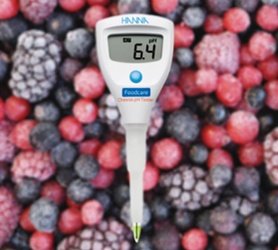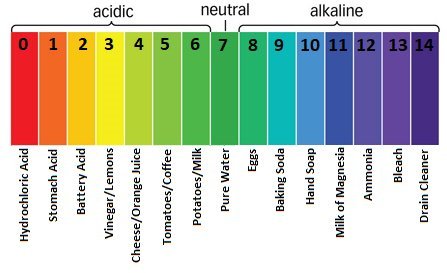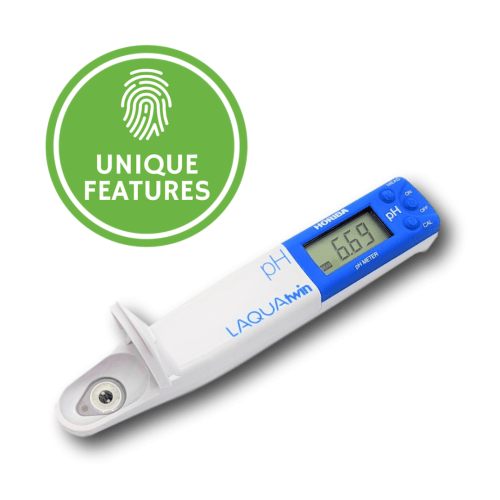The Best pH Electrodes for Food

The pH of food and beverage can have a significant impact on the quality and safety of food. Read on to learn more about why you should measure the pH of food, and how you can ensure the electrode of your pH tester is best suited to your food measuring application!
What is a food pH tester?
Food pH tester are specialised scientific instruments used to calculate the acidity or alkalinity of food and beverage. They work by measuring hydrogen ion activity, expressed as the potential for hydrogen or 'pH.'
The pH scale ranges from 0-14 with 0 being extremely acidic, 7 being neutral, and 14 extremely alkaline. Most food and drink for human consumption falls between the pH range of 3-8. See some common food examples in the table below (figure 1).

Figure 1 pH scale from 0-14 with typical food examples
Why measure the pH of food?
pH levels can impact food in six critical ways.
- Safety: Slightly acidic pH levels in food can will help to reduce the risk of common foodborne pathogens such as Salmonella and Bacillus Cereus.
- Stability: As well as reduce the risk of foodborne pathogens, a lower pH level can inhibit microbial growth, which will result in untimely food spoilage. Most bacteria will not grow at levels below pH 4.5.
- Appearance: pH will play a part in changes in pigmentation and the development of haze in some products.
- Texture: pH can affect the water holding capacity of some foods, which will influence texture. pH can also have an impact on the hard or softness of items, e.g., cheese
- Flavour: pH can provide tart, acidic or sour tastes in food.
- Fermentation: pH can affect bacteria used in the production of fermented food E.g. For Yoghurt, the required pH for this is ≤4.5.
Food Standards Australia New Zealand (FSANZ) has guidelines on some food groups to control common foodborne pathogens. Examples of foods which fall under FSANZ guidelines include;
- The acidification of sushi rice;
- Kombucha;
- pH levels for non-commercially canned fruit and vegetables;
- fermented milk and yogurt, and;
- The acidification of raw egg.
pH Electrodes
The type of pH tester you use will depend on your specific application. When searching for a pH electrode for food, you will need to know;
Is the probe suitable for the type of food or beverage you are measuring. i.e., Semi-solid items will need a sensor capable of penetration without causing damage to the electrode.
Does the electrode have the intended pH range of the items to be measured.
Is the accuracy high enough for the intended use.
Is the electrode probe waterproof and able to be thoroughly cleaned to avoid cross-contamination.
Checking these boxes when searching for a pH electrode for food is a must to ensure accurate results and avoid any contamination during pH tester use.
pH Tester Examples
The Instrument Choice Scientists have prepared some appetising examples of food pH tester ranging from general use to application-specific meters.
 pH 22 LAQUAtwin Compact pH Tester
pH 22 LAQUAtwin Compact pH Tester
Product Code: pH22
Compact and versatile, the pH22 meter can monitor the pH in solutions as small as 0.1mL. The unique flat sensor also allows for measurements of semi-solid substances, powders, and liquids, making it suited to a host of food and beverage pH measuring applications.
Specifications
pH Range: 0 to 14pH
pH Accuracy: ± 0.01 pH
pH Resolution: 0.01pH
Calibration Points: Three-point
Electrode Type: Flat glass electrode
IP Rating: IP67
Great for: Sushi rice testing, fermentation, and brewing, food freshness testing, or any semi-solid, powder, or liquid food of beverage.
 Food pH/temperature Meter for Semi-solid Substances
Food pH/temperature Meter for Semi-solid Substances
Product Code: 0563-2062
The 0563-2062 pH tester allows you to accurately measure the pH and temperature of semi-solid media food safely and reliably. This pH tester comes with a protective case, which gives it an IP68 rating. The case can easily be cleaned and is dishwasher safe, making this unit suitable for most processes in the food processing industry where hygiene is crucial.
Specifications
pH Range: 0 to 14 pH
pH Accuracy: ±0.02 pH
pH Resolution:0.01 pH
Calibration Points: Up to 3-point calibration
Electrode Type: Conical glass
IP Rating: IP68
Great for: Anywhere in the food processing industry, which requires a combination of a waterproof and easy to clean meter, e.g., viscous and protein-containing foodstuffs like jelly, cheese, fruit, and more.
 Foodcare Wine pH Tester with CPS Technology
Foodcare Wine pH Tester with CPS Technology
Product Code: IC-HI981033
The IC-HI981033 is designed to bring simplicity to pH testing during the winemaking process and solves the challenge of measuring samples with a high solids content. How? The built-in probe features a glass body, spherical tip, and Hanna Instruments unique clogging prevention system (CPS) that resists clogging 20x longer, making it perfect for measuring the pH during the winemaking process.
Specifications
pH Range: 0 to 14.0 pH
pH Accuracy: ±0.2 pH at 25 C
pH Resolution: 0.1 pH
Calibration Points: Up to two-point calibration
Electrode Type:Spherical tip
Great for: On-the-go testing of wine, wine must, and juice.
Other application-specific meters: Foodcare Cheese pH Tester, Foodcare Milk pH Tester, Foodcare Sushi pH Tester, and Meat pH Tester.
 Portable HACCP Compliant pH Tester for Meat
Portable HACCP Compliant pH Tester for Meat
Product Code: HI99163
The HI99163 portable pH and temperature meter is specifically designed for the meat processing industry to ensure a quality finished product. The pH electrode is pre-amplified and features a removable stainless steel blade. These features allow users to perform unintrusive measurements on meat products inside and out. The free diffusion junction helps to avoid a clogged reference while the outer body material is non-toxic and food compatible.
Specifications
pH Range: -2.00 to 16.00 pH
pH Accuracy: ±0.02 pH(up to 60 C)
pH Resolution:0.01 pH
Calibration Points: Up to two-point calibration
Electrode Type: Conical with stainless steel blade
IP Rating: IP67
Great for: The meat processing industry, including abattoirs, meat processing, and butchers.
Other application-specific meters: Portable Yogurt pH Tester, Portable Milk pH Tester and Portable Cheese pH Tester.
 Professional Portable Cheese pH Tester
Professional Portable Cheese pH Tester
Product Code: IC-HI98165
The IC-HI98165 is a portable pH and temperature meter designed for pH measurement in cheese. The meter comes with a specially designed pH electrode for use with cheese. The pH electrode with a built-in temperature sensor features a stainless steel body with a conical glass tip that allows for penetrations into solids, semi-solids, and emulsions for direct measurement of pH in cheese and cheese products.
Specifications
pH Range: -2.0 to 20.0 pH
pH Accuracy: ±0.1 pH / ±0.01 pH / ±0.002 pH
pH Resolution: 0.1 pH / 0.01 pH / 0.001 pH
Calibration Points: Up to five point calibration, seven standard buffers available
Electrode Type:
IP Rating: IP67
Great for: Detecting any deviations from the optimal pH range of cheese, at any stage of the production process.
Other application-specific meters: Professional Portable Beer pH Tester, Professional Portable Meat pH Tester, and Professional Portable Yogurt pH Tester.
Conclusion
The pH of food and beverage can have a significant impact on the safety, stability, appearance, texture, flavour, and fermentation of foods. A food pH Tester is a straightforward way to control these impacts as well as maintain the overall quality of your product from start to finish.
Want more information on any of the products mentioned above? Speak with an Instrument Choice Scientist! We're here to help! Call 1300 737 871 or email [email protected].
Also interesting
Air quality is most often associated with air pollution, although levels of comfort, as affected by ambient temperature and relative humidity, are also factors measured. Both indoor and outdoor environments are important. Governments and homeowners are growing in awareness as to the cost of poor-quality air. For example (when considering poor indoor air quality) :
“The CSIRO estimates that the cost of poor indoor air quality in Australia may be as high as $12 billion per year (Brown, 1998). In recent years, comparative risk studies performed by the US EPA and its Science Advisory Board have consistently ranked indoor air pollution among the top five environmental risks to public health ( US EPA, 1993 ).”
Source: Australian Government – Department of Environment and Energy
Depending on the type, concentration and environment in which poor air quality occurs, it can have long-term or short-term detrimental effects on your health and/or productivity. In the worst case, it can even result in death! The ability to accurately and reliably measure air quality is essential for both public authorities and homeowners engaged in the management of air quality.

The blanket term ‘environmental meters’ covers an extensive array of meters that measure an even greater range of environmental parameters. In this article, the Instrument Choice Scientists demonstrate how you can measure anything, and measure anything from A to Z with our vast assortment of environmental meters!

